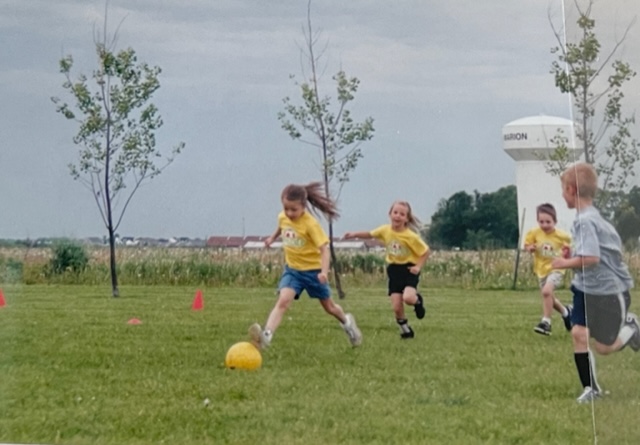Is There a J in Graduation?
Last weekend, our oldest daughter graduated from college. This morning I woke up thinking about the word graduation.

Etymology of Graduation
Where do we go for etymology? Etymonline.com or another etymology dictionary. Looking at the Latin root gradi, I noticed its denotation: “walk, go, step”. The impact a root’s denotation has on a Modern English word’s meaning is like an inherited trait from ancestors such as blue eyes or height. It’s the meaning the root’s descendants carry, sometimes very clearly. Other times less obvious, seeming like a stretch. But that connection is there.
We find the base of graduation by noting the Latin root. We remove the Latin suffix <i>. Since the final <d> is not doubled in any member of this word family, we know the English base is <grade>. Yep, we add a final, unpronounced <e>.
Graduations: Waiting & Reminiscing
She graduated in the college of life sciences, the largest college at the university. I’m not sure if the point of graduation speeches and all the waiting is to give parents time to reminisce, but it works out well for that.
Although she was our smallest baby, she was the earliest walker and talker. She had food allergies and some other health issues along the way. Two hospital stays in her toddler years gave us plenty to worry about. I remembered this little girl falling asleep standing up, leaning against a couch. She was the kid who literally put herself to bed when she was tired. Discovering one of her passions as a seven-year-old, she kicked butt, scoring and outrunning other kids in her very first soccer game.

All the Polly Pockets, Barbies, and Littlest Pet Shop pieces covering the floor as she played with her two younger sisters. There was lots of time spent playing in the backyard with her brother and sisters and our dog. Then transitioning from home school to public school. Before we knew it, she was driving off in the car by herself for the first time, dating, and moving through the high school grades.
Finally the waiting was over. We listened for her name. Darn, mispronounced even though it was written phonetically on her card. Disappointing, but it doesn’t change her achievement. She received her diploma holder and walked across the stage. They mail actual diplomas to graduates later.
Graduation’s Word Family
Grade is one of graduation’s orthographic relatives. We think of it as the sequential grades, first grade, second grade. Or it can mean the letter or number grades earned on assignments and tests. All the learning and study to finish the final steps and graduate. Everything that produced the gradual transformation into the woman she is today.
The matrix I made doesn’t include all the possible words in this family. I left off upgrade, downgrade, degrade, gradient, etc. A word family’s matrix just like a human family’s wedding invitation list often doesn’t include every member. As the creator of the matrix, you choose which to include and which to leave out.
Back to the Title Question

Is there a <J> in Graduation? I’ve seen it misspelled with a <j> or a <dg> where the <d> should be. It feels like a /dʒ/ or j-sound. The symbols in slanted brackets are the IPA (International Phonetic Association) symbol for that phoneme. English spelling isn’t based on phonology alone. It has much more to do with where a word came from, that language’s spelling of it, and often changes made over centuries.
Why is there a <d> where it feels like a /dʒ/? First, let’s look at the base of this word, <grade>. When we pronounce “grade,” we feel a final /d/ as expected. But in “graduation” our /d/ is immediately followed by a /ju/. This symbol represents the pronunciation of <u> that is very similar to the pronunciation of “you.” When you say /d/ followed by /ju/, you’ll feel the /dʒ u/.
Still not sure about this? Take a minute to feel what your mouth does when you say, /d/ and then “jump.” Where is your tongue at the beginning of that word’s pronunciation? Wash your hands and stick a clean finger behind the upper front teeth. Say /d/ and then say the word “jump” again. Feel it?
Giving students this understanding gives them a meaningful tool. It’s a memorable reminder that while it does feel like /dʒ u/, we spell this word with the base <grade> because it’s related to grade. These Spelling and Meaning Connections will gradually stick and make a difference for our students in both reading and spelling.


